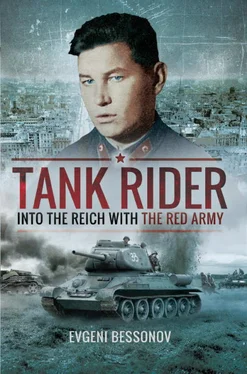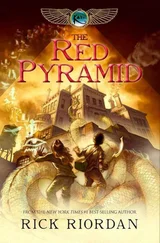The rest of the matériel, as well as most of the transport vehicles of the battalion was destroyed. The 4th Tank Army had no more than 60 tanks left out of 450, the tank regiment of the Brigade had just few tanks left of the initial 33 tanks. Out of those that remained, all were damaged.
No more than 50 or 55 men remained out of 550 soldiers and NCOs of our battalion. Losses among officers were also high. Out of 45 officers no more than 50% remained, the rest were killed or wounded and sent to hospitals. Just six out of 22 platoon leaders were left. Young soldiers, 18 or 19 years old, the cream of our country, died for the liberation of their Motherland from the German Nazi invaders. Officers, platoon leaders and company commanders, also died, often being just little older than their soldiers – they were 20 to 22 years old. One can always replace losses in military hardware, tanks and equipment, but one can never replace losses in personnel…
IN RESERVE AT KOPYCHINTSY

We marched on foot from the front line to the rear area, while the battalion command went there by car, ‘pilots’, as we called them. We walked without any haste for several days, before we finally arrived at our destination. We built shelters and settled there. For some reason only I was present in the battalion out of all the junior officers, the others fell behind somewhere. The battalion commander called on me and appointed me officer of the day in the battalion. A heavy rain started during the night; I was tired and my sentries were also tired. We lay under the tarpaulin that made do for the tent that we had not set and fell asleep. In the morning the battalion commander found me and woke me up; but he was not angry with me even though I had slept and not organized breakfast for the men of the battalion. I quickly corrected my mistake and told the cooks to start making food.
Replacements started to arrive, many officers, as well as soldiers and NCOs, came back from hospitals. Senior Lieutenants Fomin and Grigoriev (he was appointed the battalion’s chief of staff), platoon leaders Lieutenants Shakulo, Gavrilov, Guschenkov, Drogovoz, Kravtsov (he had to spend over two months recuperating after the burns he received) came back. As we were receiving personnel, we started training and putting the units together. We taught them what they would need in battle, tried to strengthen discipline, eradicating laxity that had appeared in behaviour at the front. No one saluted at the front line. Some liberties that could not be tolerated in an army in peacetime appeared in relations between soldiers and commanders at the front. We did combat training at company and platoon level with live ammo. We had to teach green soldiers everything: taking care of weapons, assembling and disassembling the PPSh submachine-gun (we did not have rifles), applying camouflage on terrain, advancing in rushes, digging foxholes, sneaking on the ground, mounting a tank and skilfully dismounting it, even on the move. We even taught them how to shout ‘Hurrah!’ Soldiers fight the way you teach them. We taught them to attack in squads, platoons, to sense comradeship. In short, we knitted the platoon and the company together in one fist, so that we would be superior to the enemy in battle, so that it would be his Kaputt , not ours.
We lived in shelters that we built out of pine-tree branches, some people covered the shelters with tree bark. The battalion commander, his deputies and other staff officers lived in staff vehicles or in tarpaulin tents, which the company did not have, and when it rained we covered our shelters with rain capes. The weather in the Ukraine was warm. Studying was studying, but we were young and tried to entertain ourselves as best we could. Some of us went to the nearest village Maidan, and exchanged some war trophies for moonshine, lard, wheat bread and even milk. We even arranged parties in the village – we sang and danced, while some stayed with the girls till the morning. We were young and healthy and strong, we were happy to live without thinking what lay ahead of us.
Shakulo, some other officers and I were awarded with the Order of the Red Star. That was my first decoration of the War. Many soldiers from the company were awarded as well. Lieutenant Zaitsev was appointed deputy battalion commander for logistics, Lieutenant Volkov was appointed commander of battalion’s machine-gun company, Lieutenant Chernyshov was appointed the 1st company commander. Newly arrived officers were appointed commanders of the 2nd and 3rd companies, although, from my point of view, I and Belyakov and Shakulo deserved to become commanders of our companies. We had all had secondary school education, graduated the six-month course in a military academy, had been in the battalion for a long time and had a two-year record of service as officers, but we remained just platoon leaders. I just do not know why it happened that way. Later I was also not lucky in my career and decorations, but we somehow did not pay attention to that – you survive and that’s enough, what else can you desire? Commanders in higher offices, however, reacted quite sensitively about the unfair distribution of decorations. There was a rumour that battalion commander Kozienko beat up politruk Gerstein, as in his opinion, Gerstein had been awarded with a higher order than Kozienko himself for the Kamenets-Podolsk operation – Kozienko was awarded with the Order of Bogdan Khmelnitski, while Gerstein received the Order of Great Patriotic War 1st degree. Kozienko was temporarily suspended from the office of battalion commander for that fight, but before the next Lvov operation he was re-appointed. As it turned out later, a Lieutenant Colonel, a teacher from the Military Academy of Armoured Troops, entered the battalion for an internship during the period of Kozienko’s dismissal. He started to require us to learn and know the field manual of the armoured troops instead of the infantry field manual. Although we were not tankers and never led tanks, we even had to pass some exams, but he quickly left and returned to the Academy.

THE LVOV–SANDOMIR OPERATION

Map to show the Lvov-Sandomir operation, July to August 1944.
Our ‘vacation’ and training for the battles to come was about to end. In early July 1944 our battalion along with the other battalions of the 49th Kamenets-Podolsk Mechanized Brigade, marched on foot towards the front line, to the concentration area, from which we were supposed to go over to the offensive. Intensive fighting was ahead of us.
We only marched in darkness and till dawn; in daytime we stayed in forests and groves, taking camouflage measures. By night the road to the front turned into a mighty stream of troops of all branches of service: infantry, artillery of all calibres, armoured personnel carriers. Tanks drove on other roads in order to confuse the enemy. Camouflage and concealment requirements were strictly followed, all soldiers understood its necessity – otherwise we would have been bombed. Regardless of how hard it was to find a good place for daytime rest, battalion commander Kozienko tried to position the battalion near some water, by a small river for example. It was of great significance in the hot summer days in Ukraine – one could wash or cool down tired feet, or wash their foot wrappings after exhausting night march in huge clouds of dust. All movement died out in daytime – we feared air raids.
Читать дальше














